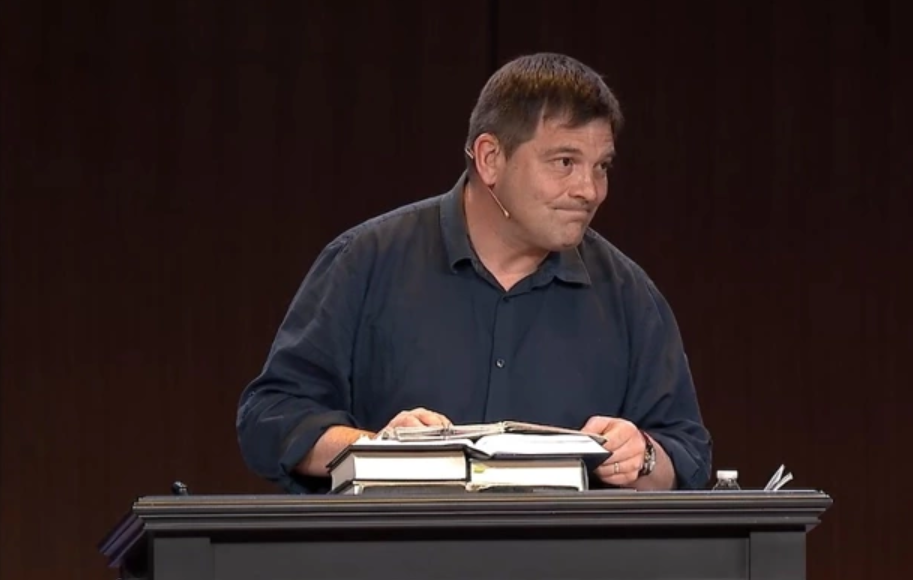Rico Tice, a well-known Evangelical leader and former Church of England clergyman, has left the denomination in reaction to what he perceives as its growing departure from biblical values, especially concerning same-sex marriage and repentance.
Tice, best known for co-writing the evangelism course Christianity Explored and co-founder of Christianity Explored Ministries, cited the denomination’s recent decision to allow priests to bless same-sex couples and its lack of substantive response to concerns laid out by him and five other leaders of CofE-connected parachurch organizations last October.
In an interview with Evangelicals Now, Tice, the former senior minister at All Souls, Langham Place in London, explained that he now worships at the International Presbyterian Church (IPC) in Ealing, London.
“Last October, I was one of six Evangelical leaders of parachurch organizations with connections to the Church of England who wrote to [Archbishop of Canterbury] Justin Welby and all the bishops explaining our deep ‘heaviness of heart, soul and mind’ about the church’s onward trajectory toward affirming same-sex marriage, specifically the new Prayers of Love and Faith,” he said.
“We called upon the archbishop to resist the influence of cultural values when they are in opposition to those of the Bible. We did this because it was harming our ability to work with orthodox people from other denominations — how could they trust us? We received no substantive response from him, and that was a key moment in my decision to leave.”
CofE’s “Prayers of Love and Faith” are new guidelines enacted last December that allow priests to bless same-sex couples but don’t require them to do so, a measure opposed by many Evangelicals within the Church of England amid a growing divide within the Anglican community regarding same-sex marriage and biblical orthodoxy.
Tice said the move to the International Presbyterian Church in Ealing, London, was motivated by a desire to maintain alignment with his values. He has had a longstanding relationship with the church’s minister, Paul Levy.
He said the congregation’s emphasis on eldership, Reformed theology and the Westminster Confession appealed to him. Tice still retains his permission to preach, which allows him to speak in CofE congregations.
“But I think it vital that I demonstrated clear separation from a church that no longer affirms biblical orthodoxy, especially with regard to preaching repentance,” he said.
Tice’s role at the International Presbyterian Church includes evangelism and training on evangelism techniques like Christianity Explored, Hope Explored and The Word One to One. But he sees himself as an ordinary member of the congregation, attending services with his family and engaging in fellowship with other church members.
Tice expressed disappointment and sadness, describing the situation in the CofE as “utterly heartbreaking.”
“In retrospect, I was naïve about our current culture in the Church of England because I never thought I would see such a clear, pervasive denial of the Christian’s need to repent of each and every sin they commit,” he said.
Tice remains connected to the Anglican community, expressing a commitment to the Global South model of world Anglicanism, saying he considers himself “a cradle-to-grave Anglican.”
“But the sad fact is that the Church of England has left Anglicanism,” he said.
He advised Evangelicals considering leaving the CofE to support orthodox clergy and local Christian structures and unite those who share similar values.
By a vote of 24 to 11 last December, CofE bishops affirmed their previous decision to approve the final texts of “Prayers of Love and Faith” for use in regular public worship or private prayer.
The texts were also published with pastoral guidance explaining how they can be used, and the House of Bishops also claimed that it would consider a pastoral provision to protect the consciences of those who wish to use the prayers and those who do not.
Leading up to the approval, many within the Anglican community voiced their disapproval of the proposal.
In April 2023, over 1,300 conservative Anglicans from over 52 countries gathered in Kigali, Rwanda, and issued a statement calling for a “resetting” of the worldwide Anglican Communion after the Church of England voted to approve the blessing of same-sex couples.
“Since the Lord does not bless same-sex unions, it is pastorally deceptive and blasphemous to craft prayers that invoke blessing in the name of the Father, Son and Holy Spirit,” the statement known as the “Kigali Commitment” reads.
“Public statements by the Archbishop of Canterbury and other leaders of the Church of England in support of same-sex blessings are a betrayal of their ordination and consecration vows to banish error and to uphold and defend the truth taught in Scripture.”
In July 2023, 27 Evangelical leaders, including Pastor Nicky Gumbel, the developer of the internationally popular Alpha evangelistic course, sent a letter to the College of Bishops contending that it would be unlawful for the bishops to commend the blessings. They called for the CofE General Synod to be given an opportunity to vote on Prayers of Love and Faith under Canon B2, requiring a two-thirds majority in each of the Synod’s three houses.
The Christian Post








